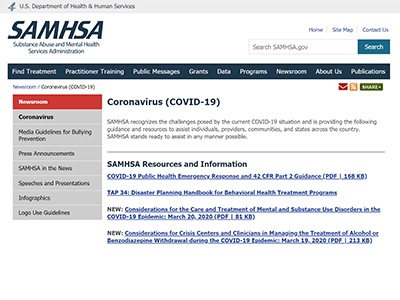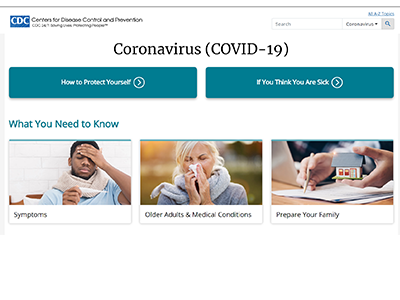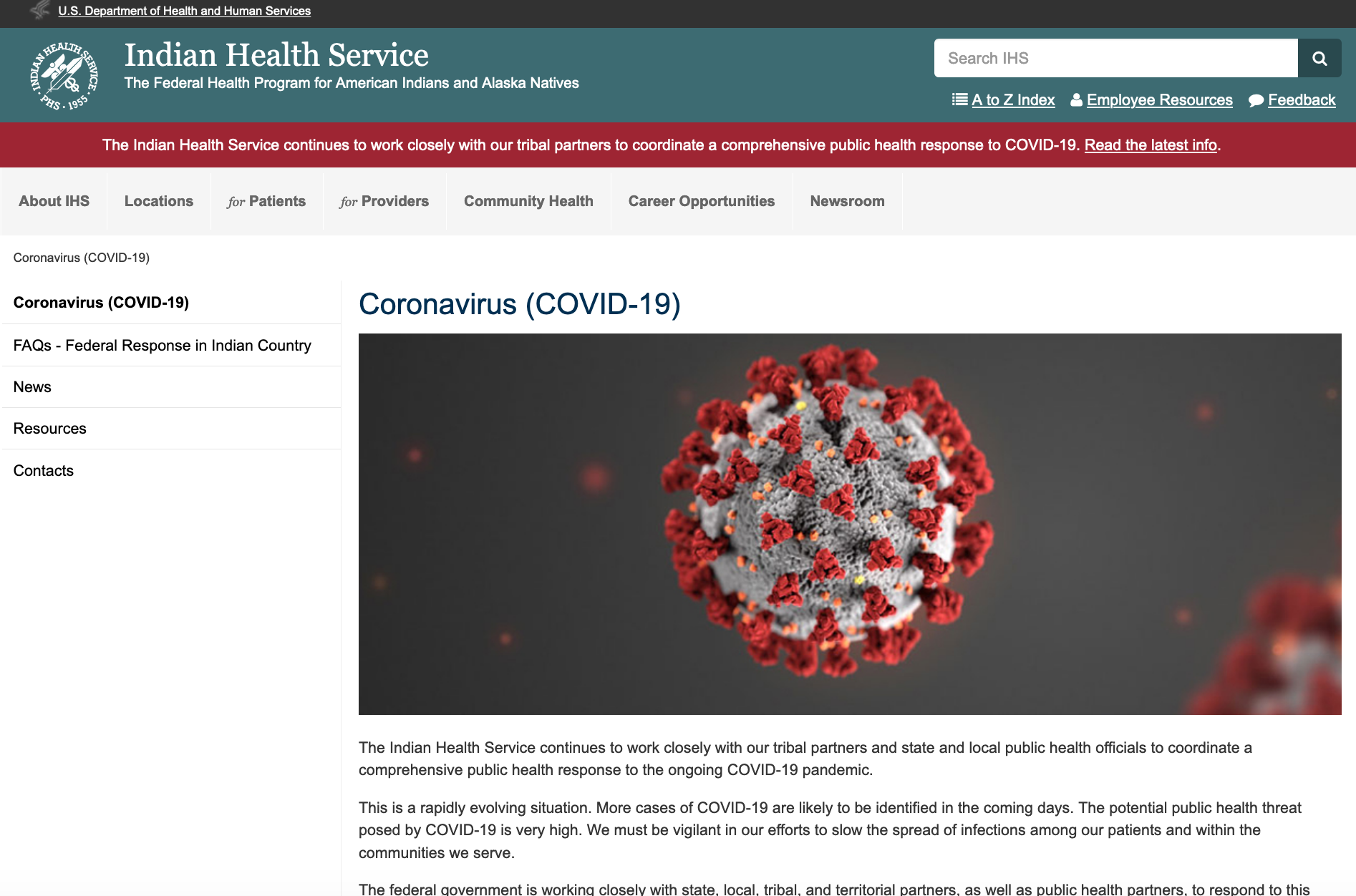Home > Pandemic Response Resources
 SAMHSA.gov Resources
SAMHSA.gov Resources
 CDC.gov Resources
CDC.gov Resources
 IHS.gov - Indian Health Service Resources
IHS.gov - Indian Health Service Resources
 Listening Session and Strategic Discussion Series
Listening Session and Strategic Discussion Series
The Addiction Technology Transfer Center (ATTC) Network, and the Prevention Technology Transfer Center (PTTC) Network are facilitating a FREE, national online discussion and resource sharing opportunity for the substance use (SU) prevention, treatment, and recovery workforces focused on emerging issues around social determinants of health (SDH) and COVID-19. Check out the series webpage to watch recorded webinars and download relevant resources.
Self-Care in a Selfless Field Webinar
Presented by the Mountain Plains PTTC, this webinar touches on possible signs of burnout, how to implement self-care practices to your daily life, and receive available resources to combat the effects of work-related stress. This webinar was held on April 21, 2020. Download the presentation slides, recording, and resources.
PFS Academy 2020: Making the Steps of the Strategic Prevention Framework Work for You
SAMHSA’s Strategic Prevention Framework (SPF) provides practitioners with comprehensive guidance to more effectively address substance misuse and related behavioral health problems in their communities. This seven-part webinar series will explore this five-step, data-driven process to identify genuine prevention needs, build capacity and plans to address those needs, implement effective programs and interventions, and evaluate and continually improve prevention efforts.
 Prevention Practitioner’s Role in Disaster Response
Prevention Practitioner’s Role in Disaster Response
The purpose of this checklist is to prepare the preventionist for their role before and after disasters. They have unique skills that can assist and align with disaster response efforts.
Additional disaster resources can be found at South Southwest PTTC's Disaster Resources page
Social Development Strategy Slide Deck for You by the Northwest PTTC
This is a 10-slide downloadable deck highlight the Social Development Strategy. It includes notes for prevention practitioners to incorporate into presentations.
Substance Use Disorder Services in the Days of a Pandemic: You Need A Bigger Boat!
(Watch Below)
Connecting Prevention Specialist to Native Communities During Times of Crisis: Listening Sessions
 The National American Indian & Alaska Native PTTC would like to invite you to join the first session: Connecting Prevention Specialists to Native Communities During Times of Crisis: Listening Sessions.
The National American Indian & Alaska Native PTTC would like to invite you to join the first session: Connecting Prevention Specialists to Native Communities During Times of Crisis: Listening Sessions.
The National American Indian & Alaska Native PTTC will be holding virtual sessions to support our Native communities in these challenging times. Our first session will include a time of listening when you can share thoughts and concerns about the current needs and challenges that your communities and programs are facing, as well as bringing up topics you would like us to cover in future sessions. We hope these meetings will be supportive and helpful, and that we can help connect you with the resources you need. Also feel free to reach out to Cindy Sagoe in advance to let her know if there are any topics you specifically want us to be prepared to address. We hope each and every one of you are staying safe and we look forward to connecting with you soon!
***Check out our sister Networks’ pandemic response resources at MHTTCnetwork.org and PTTCnetwork.org.
Strengthening Families Program - Home Use course (DVD or online)
Dr. Karol Kumpfer, creator of the Strengthening Families Program, and Jaynie Brown teamed up to create a new 11-session SFP7-17 Years Home-Use video (DVD or view Online). This new SFP universal prevention version is an entertaining series of parenting and family-life skills for parents and children to watch together at home. It has 11 thirty-minute lessons including an Introductory Lesson that discusses the benefits of SFP to promote positive brain development and resiliency, and a Mindfulness segment to promote better emotional regulation. It comes with an optional Spanish audio track.
The University of Washington Center for Communities That Care (CTC)
CTC is a prevention-science framework that helps communities promote healthy youth development, improve youth outcomes, and reduce problem behaviors. We help communities learn about CTC and offer personalized support in its implementation. The CTC system consists of web workshops filled with instructional videos, materials, and our latest research, along with ongoing strategic consultation and coaching support to communities and states.
PROSPER: PROmoting School-community-university Partnerships to Enhance Resilience
PROSPER isn’t a program, rather it is a scientifically-proven delivery system that facilitates sustained, quality delivery of evidence-based programs that reduce risky youth behaviors, enhance positive youth development and strengthen families.
Sources of Strength: COVID Online tools and Resources
Sources of Strength provide the highest quality evidence-based prevention for suicide, violence, bullying and substance abuse by training, supporting, and empowering both peer leaders and caring adults to impact their world through the power of connection, hope, help and strength.
Too Good
Too Good programs empower children with the social-emotional learning and substance abuse prevention skills they need to lead happy and healthy lives.
Alcohol and Drug-Related Problem Prevention Education & Resources by PRI
Prime For Life® (multiple syllabus options available), Prime For Life® 420 (THC-focused), and Prime Solutions® (treatment-focused) are research-based, motivational programs that encourage making low-risk alcohol and drug choices and protecting what we value most in life. Instructor/counselor training and Continuing Education courses for prevention specialists available online, along with information on adapting program implementation to social distancing requirements. Created with all ages and audiences in mind by Prevention Research Institute – a private, nonprofit organization.
* Modification of Evidence-based Practices
Please note that Evidence-based practices (EBPs) are practices, programs or interventions that have met scientific criteria for efficacy through experimental testing. In order, to get the same effects as the EBP they should be implemented with fidelity. Modifications or adaptations of EBPs may be necessary in real-world settings due to changes in systems and institutions. In these cases, the expected outcomes of EBPs will differ. When possible consultant with the developers of the EBP to get information on how modifications can be made.
References
Page updated 7/24/2020